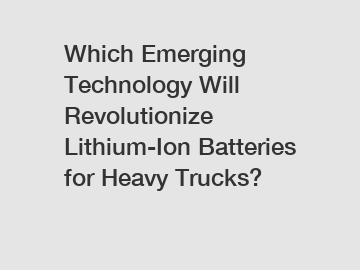Which Emerging Technology Will Revolutionize Lithium-Ion Batteries for Heavy Trucks?
As our world shifts towards sustainable transportation, the demand for efficient energy storage solutions for heavy trucks has become increasingly crucial. Lithium-ion batteries have already transformed the automotive industry, but their potential to power heavy-duty vehicles has yet to be fully realized. Fortunately, emerging technologies are on the horizon, poised to revolutionize lithium-ion batteries for heavy trucks.
1. Solid-State Batteries:
One technology that shows tremendous promise is solid-state batteries. Unlike traditional lithium-ion batteries, which use liquid electrolytes, solid-state batteries employ solid electrolytes. This advancement not only enhances the safety and stability of the batteries but also significantly improves energy density and charge/discharge rates.

With increased energy density, solid-state batteries can offer longer driving ranges for heavy trucks. Moreover, their enhanced charge/discharge rates have the potential to reduce downtime significantly. These advancements are likely to drive the adoption of solid-state batteries in heavy truck applications and ultimately revolutionize the industry.
2. Graphene-based Batteries:
Graphene, a one-atom-thick layer of carbon, has garnered immense attention for its extraordinary properties. When integrated into lithium-ion batteries, graphene-based materials offer several advantages. With superior electrical conductivity and high surface area, these batteries can potentially store more energy, resulting in increased range and power for heavy trucks.
Furthermore, graphene batteries exhibit exceptional thermal management properties, mitigating risks associated with overheating. Moreover, their faster charging capabilities can transform heavy truck fleet operations by minimizing downtime and ensuring more efficient logistics.
3. Lithium-Sulfur Batteries:
Lithium-sulfur batteries have emerged as another noteworthy contender for revolutionizing energy storage in heavy trucks. By replacing traditional cathodes with sulfur-based materials, these batteries can achieve significantly higher energy densities. Additionally, sulfur is abundantly available and less expensive than other materials, making lithium-sulfur batteries a cost-effective alternative.
Although early lithium-sulfur batteries suffered from issues like low cycle life and self-discharge rates, recent advancements have addressed many of these shortcomings. With ongoing research and development, lithium-sulfur batteries have the potential to become a game-changer in heavy truck electrification on account of their high energy density and cost-effectiveness.
4. Advanced Anode Materials:
The anode, or negative electrode, plays a crucial role in the performance and durability of lithium-ion batteries. Recent breakthroughs in anode material technologies are set to revolutionize heavy truck batteries. For instance, silicon anodes offer significantly higher specific capacities than traditional graphite anodes, providing greater energy storage potential.
By incorporating silicon composites or nanostructured silicon anodes, heavy truck batteries can now store more energy, achieve longer ranges, and support faster charging. Additionally, advancements in stable solid electrolyte interfaces and binder materials have addressed the challenges associated with the expansion and contraction of silicon.
Conclusion:
The future of heavy trucks lies in sustainable transportation solutions, and lithium-ion batteries are at the forefront of this transformation. Emerging technologies, such as solid-state batteries, graphene-based batteries, lithium-sulfur batteries, and advanced anode materials, are poised to revolutionize the industry by enhancing energy density, reducing charging time, and increasing overall performance.
As continuous progress is made in research and development, these emerging technologies will shape a greener and more sustainable future for heavy truck transportation. The adoption of these advancements will not only address environmental concerns but also offer substantial benefits in terms of cost-effectiveness and operational efficiency for fleet operators.
With heavy trucks contributing substantially to global emissions, it is imperative to invest in these emerging technologies to accelerate the electrification of the sector and reduce its carbon footprint. By revolutionizing lithium-ion batteries, we can advance the sustainability agenda and pave the way towards a cleaner and more efficient future for heavy truck transportation.
For more information, please visit battery carts, battery supplier, advantages of lithium-ion rv battery.


